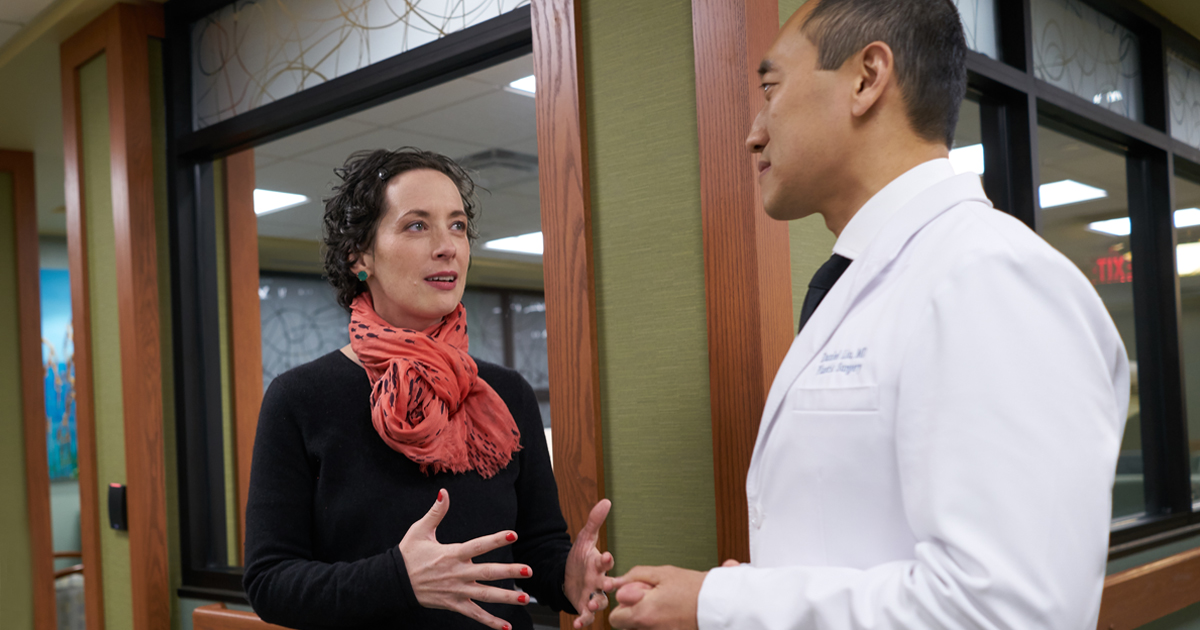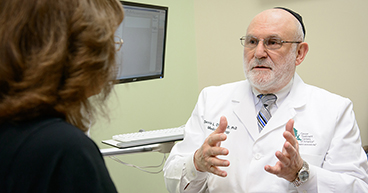
Many questions and concerns may be running through your mind before undergoing breast reconstruction surgery. How long will the procedure last? What will my reconstructed breasts look like? Will I be in pain afterward? No matter how prepared you are for surgery, you will still have questions for your doctor in the days that follow, and you should make sure to ask them before ever leaving the hospital, experts say.
“ Your surgeon should go over everything with you beforehand. But patients are often stressed and taking a lot in at that time. Plus, many of the recommendations vary from patient to patient and from surgeon to surgeon, and they also largely depend on what type of procedure the patient had.” - Aaron Pelletier, MD - Plastic and Reconstructive Surgeon at our hospital in Chicago
To help patients prepare for life after breast reconstruction, Dr. Pelletier and Daniel Liu, MD, Plastic and Reconstructive Surgeon at our hospital in Chicago, answer common questions about what to expect and what to do after surgery:
Q. Will I be able to wear a normal bra afterward?
A. Whether you wear a surgical bra after your procedure will likely depend on your surgeon’s preference and the type of surgery you had performed. Some patients will benefit from wearing a compression bra around the clock for the first four to six weeks, but many will be advised not to, Dr. Liu says. Underwire bras and bras that don’t provide much support generally aren’t recommended in the first six weeks after surgery.
Q. Can I shower after surgery? What about exercise?
A. Patients are typically encouraged to begin showering 48 hours after surgery, and to use warm, soapy water. You shouldn’t worry if water comes in contact with your incisions or drains. As for exercising, ask your surgeon when you may begin working out again, because advice may vary based on the type of surgery you had performed.
Q. Is massage recommended?
A. Massaging may help improve the appearance of scars or break up deeper scars in the soft tissues and chest wall that cause pain or issues with range of motion. But in other cases, such as when shaped implants and expanders are used, massaging is not recommended right after surgery. “Patients need to talk to their surgeon about this and follow his or her advice,” Dr. Pelletier says.
Q. Are there ways to help scars fade?
A. It may take a year or two for tissues to fully heal and for scars to fade, but, typically, scars never go away completely. Although many products, such as vitamin E oil and topical silicone gel sheets, are often touted as tools to help scars fade or disappear, none has been scientifically proven to do so.
Q. How long will drains remain in place?
A. Drains are small tubes placed in the incision that, over time, help to remove extra fluid during the healing process. Drains are commonly used in all types of reconstruction procedures, but many factors go into determining how many drains are used, and when they are removed. Most often, your surgeon will share these details with you before your procedure.
Q. How long does it take for swelling to go down and for the new breast to reach its final size and shape?
A. Each person is different, and much of the recovery process depends on the type of procedure performed. That said, it usually takes about three to six months for swelling to subside and for your breast to achieve a final shape, but it may take longer, particularly for patients who received radiation therapy for breast cancer treatment. Radiation permanently damages tissue at the microscopic level, which makes it harder for tissue to heal.
Also, keep in mind that final breast shape is often affected by gravity and tissue elasticity.
Q. How long do implants last?
A. Newer-generation gel implants will likely last the patient’s lifetime. “I usually tell my patients that in 10 to 15 years, they may need another operation to revise or exchange their implants,” Dr. Liu says. But no surgeon should provide a guarantee as to how long the implants may last. Patients may choose to have their implants exchanged later in life for a number of reasons, and most have nothing to do with problems with the implant itself.
But if a problem does arise, it is most often what’s called capsular contracture, which occurs when a scar forms around an implant and squeezes it, making the breast feel hard. This condition is often treated with surgery to remove the scar and possibly replace the implant.
Q. Will I have to have another procedure?
A. Breast reconstruction often involves more than one procedure, because it usually takes two or more surgeries to complete the reconstruction process while allowing time to heal in between. Sometimes, the process involves a revision procedure. Other times, a follow-up surgery may be necessary to achieve symmetry, while other procedures may be performed to reconstruct the areola or apply a nipple tattoo. “Everyone is different in terms of what she needs and wants, and this is something every patient should discuss with her surgeon,” Dr. Liu says.
Q. Will I still have to have mammograms and perform self-breast exams?
A. Experts say women who have breast reconstruction after a mastectomy don’t need routine mammograms. But if a physical exam finds something concerning, a diagnostic mammogram, ultrasound or MRI may be performed. Every breast reconstruction patient should perform weekly self-breast exams and have annual exams performed by her surgeon, Dr. Liu says.
For women with silicone gel-filled implants, the U.S. Food and Drug Administration recommends that women receive a breast MRI three years after they receive their implants, and every two years after that, to look for signs of ruptures.
Q. When will the numbness go away and feeling return to my breast?
A. Some feeling may return after a number of years, but patients shouldn’t expect a reconstructed breast to recover full feeling. Some numbness is likely to persist even years later.
Breast reconstruction surgery often causes many changes—both physical and emotional. It may take time for you to accept your new breast as your own, especially if it looks nothing like your old breast. Talking with other women who have undergone the same experience may help. Talking with your doctor about what to expect may also offer a sense of control over the road ahead. And make sure to call your doctor if you notice troubling symptoms after your surgery.
“Although it may be a stressful time, listen to your doctor before leaving the hospital,” Dr. Pelletier says. “Before you’re discharged, you should understand how to take care of your surgical sites and how you should care for your breast based on the surgery you had.”


